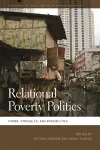
Relational Poverty Politics
2 contributors - Paperback
£34.95
Dr. Meghan Cope is an urban social geographer. She is mainly interested in the ways that social, economic, political, and environmental processes influence cities and communities, as well as the ways that people′s everyday lives create meaningful spaces and places within, or even against, the larger-scale processes operating on them. Her focus has always been on social/spatial processes of marginalization and disempowerment, for example, through gender, race/ethnicity, class, youth, etc. She is especially motivated by issues such as employment, households and neighborhoods, welfare, public space, poverty, discrimination, and identity. She is also a qualitative researcher who uses ethnography and other methods to learn about the geographic meanings and processes that matter to marginalized groups. Over the past 10 years she has developed an associated interest in critical perspectives on Geographic Information Systems (GIS) and have explored methods of combining qualitative research with GIS (Cope & Elwood, 2009). Sarah Elwood is a professor of geography at University of Washington and cofounder of the Relational Poverty Network with Victoria Lawson. Her research contributes to relational poverty studies, critical GIScience and digital geographies, visual politics and mixed methods, and urban geography. Current activities include research on poverty politics of creative activisms around homelessness, feminist and critical race theorizations of digital geographies, and a collaborative public scholarly project on horizons of critical poverty studies under emerging national populisms. She is the coeditor of Relational Poverty Politics (University of Georgia Press, 2018), Crowdsourcing Geographic Knowledge (Springer, 2012) and Qualitative GIS (SAGE, 2009) and author of journal articles in Progress in Human Geography, Annals of the Association of American Geographers, International Journal of Geographic Information Science, and others. She holds an MA and PhD in geography from the University of Minnesota and a BA in Geography from Macalester College.